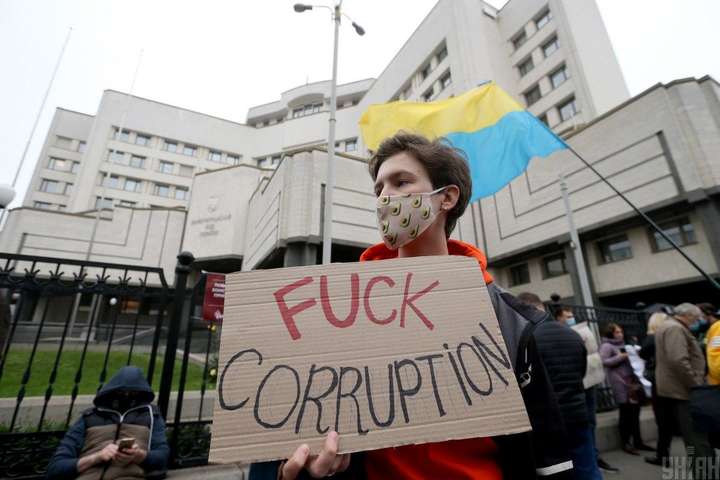On December 11 Ukrainian society was hit by the news of Roman Nasirov, ex-head of the State Fiscal Service of Ukraine, being reinstated at his position. Nasirov is suspected in causing UAH 2 bn ($73.7mn) of damage to the state. He is a suspect in the so-called gas case of the runaway oligarch and ex-MP Oleksandr Onyschenko
The case against Nasirov was the first high-profile investigation by two new anti-corruption institutions created after the Euromaidan Revolution under the demand of civil society – the National Anti-Corruption Bureau (NABU) and the Specialized Anti-Corruption Prosecutors Office (SAPO) – which was supported by Ukraine’s western partners.
NABU and SAPO specialize in investigating top-level corruption. The case against Nasirov was the very first proof of the effectiveness of the two. Before, top-officials like him were considered untouchables in Ukraine. After some time of NABU and SAPO’s work, it became clear that investigation is only a part of the job. The cases have to be finalized in courts and this where the problems start. During the three years of NABU and SAPO’s work, Ukrainians saw many investigations against top-officials. But by August 2018, only two verdicts had finished with sentences.
Civil society activists sounded the alarm, claiming that the cases are simply stuck in Ukraine’s unreformed courts.
“54% of the hearings we attended did not take place. The majority (64%) of them because court members were absent: vacations, sick leave, and participation in other cases. 42% of hearings lasted less than 30 minutes. That is why in fact the cases are considered over two to three years,” said Vadym Valko, a coordinator and the analyst of the monitoring of the Council for Public Control at NABU.
Read also: Overloaded Ukrainian courts obstructing justice in top corruption cases
This problem made civil society advocate the idea of creating a High Anti-Corruption Court specially for cases on top-corruption. The process of selecting judges for it is expected to be completed in February-March 2019.
Until then, cases in anti-corruption are considered by the old courts.
Hopes for renewing justice were high after Nasirov’s arrest
In March 2017, Nasirov was arrested over his involvement in the gas case related to Ukraine’s runaway oligarch and ex-MP Oleksandr Onyschenko. According to investigators, the Fiscal Service head allowed Onyschenko’s companies to avoid taxes and necessary fees.
Nasirov is also suspected of interfering in Ukraine’s electronic administration of VAT.
Both investigations can lead to a long prison sentence.
Read also:
- The case against Ukraine’s Fiscal Service chief might break the corrupt political system
- Ukraine’s first anti-corruption case against top official becomes soap opera
But some expressed doubts whether Nasirov would be convicted.
“First of all, I am a lawyer, and I can’t say for sure now that Nasirov will be convicted. But if hypothetically it happens, people would renew their feeling of justice. That a person who broke the law serves his sentence. And this is the most important thing we should aim for,” Oleksandr Liemienov, the head of StateWatch NGO told Euromaidan Press.
In March 2017, Kyiv’s Solomianskyi District Court chose a preventive measure for Nasirov – 60 days under arrest with an alternative of a UAH 100 mn pledge ( $3.6 mn) paid by his wife. Also, Nasirov was suspended from his duties. In January 2018, the Cabinet of Ministers of Ukraine dismissed him from the position of the head of the Fiscal Service. Roman Nasirov filed a lawsuit against the Cabinet of Ministers and the Fiscal Service, and claimed that the case against him was directed at “impeding his political activity, and that “political opponents” feared his “real fight against corruption and changes in the Fiscal Service system.”
And after a year and a half of court hearings on the case, the worst fears of society came true.
On December 11, Kyiv’s District Administrative Court decided to reinstate him in his position, stating that he was fired without adhering to the necessary procedures and that the defendants did not prove there were grounds for Nasirov to be fired. The court also decided that Nasirov should be compensated UAH 184,000 ($6,637) for the period of his forced absence, Ukrainska Pravda reported referring to the court decision.
Nasirov’s reinstatement is to be implemented immediately, the court ruled.
This particular court is one with a nasty reputation, Mykhailo Zhernakov, director at the DeJure Foundation stated. According to him, the Kyiv District Administrative court was created during the times of disgraced ex-President Yanukovych to make politically motivated decisions. The court has not been reformed in any way, and none of its judges have been fired despite unlawfully repressing Euromaidan activists during the protests of 2013-2014 and making the decision for the Berkut riot police to forcefully disperse it, Zhernakov claims.
However, the trial against Nasirov is ongoing – prosecutors are reading the indictment. The Cabinet of Ministers plans to appeal the decision, Vadym Denysenko, Prime Minister Volodymyr Hroysman’s representative to Parliament, stated. He claims that the Cabinet’s decision to fire Nasirov was perfectly legal.
In summer 2018, Nasirov stated that he is planning to campaign for the chair of the president of Ukraine.








